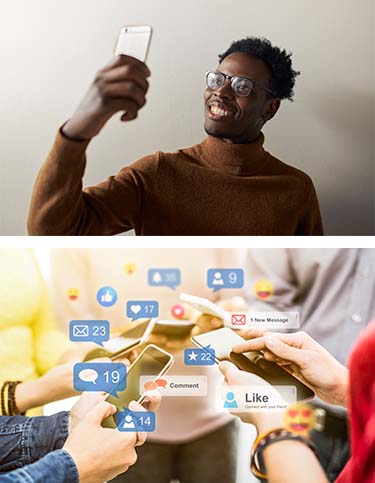Like Bait: Is Social Media Fueling a Narcissistic Epidemic?
The curated highlight reels, the endless stream of selfies, the constant battle for likes – is social media morphing us all into self-absorbed narcissists? This pervasive question sparks heated debate. While narcissism, a personality disorder characterized by an inflated sense of self-importance, exists in the real world, social media platforms do seem to provide fertile ground for narcissistic tendencies to flourish. Let's delve deeper into this complex relationship.
The Narcissistic Playground:
Social media offers a platform for self-promotion unlike any other. Here's why it can fuel narcissism:
- Validation Seeking: The like button becomes a proxy for self-worth. The number of likes and followers feeds the desire for external validation, creating a dependence on online approval. This constant need for affirmation can breed feelings of inadequacy and insecurity.
- The Carefully Crafted Self: Social media feeds are meticulously curated, showcasing the best versions of ourselves. This constant performance can distort self-perception and create a pressure to maintain a facade of perfection.
- Echo Chambers and Confirmation Bias: Social media algorithms tend to reinforce existing beliefs, creating echo chambers where users are primarily exposed to content that validates their views. This can lead to a sense of entitlement and a lack of empathy for those with differing opinions.

Beyond Likes: The Darker Side
Narcissism on social media isn't just about vanity posts. It can manifest in more toxic ways:
- Cyberbullying and Online Harassment: The anonymity of the online world emboldens negativity. Narcissists may use social media platforms to belittle, harass, and troll others, seeking to inflate their own sense of importance by diminishing others.
- Attention Seeking Through Conflict: Some individuals crave attention, even negative attention. They may post inflammatory content or engage in online arguments to provoke reactions and maintain their place in the spotlight.
- Social Comparison and Envy: The constant barrage of "perfect" lives on social media can fuel social comparison and envy. This can lead to feelings of inadequacy, depression, and even resentment towards those perceived as more successful.
Are We All Doomed to Be Narcissists?
Social media isn't inherently bad. However, it's crucial to be mindful of its potential pitfalls. Here's how to navigate the social media landscape without succumbing to narcissism:
- Practice Mindful Posting: Focus on authenticity over perfection. Share experiences you genuinely enjoy, not just for the sake of likes and validation.
- Follow Inspiring Accounts: Curate your online experience by following accounts that uplift and motivate you. Seek out positive and diverse perspectives.
- Disconnect to Reconnect: Take regular breaks from social media. Reconnect with the real world, nurture genuine relationships, and invest in activities that bring you joy outside the digital realm.
- Seek Help if Needed: If social media is negatively impacting your mental health, don't hesitate to seek professional help. A therapist can equip you with strategies for managing social media use and developing healthier coping mechanisms.
Conclusion
Social media is a powerful tool that can be used for good or bad. While it can amplify narcissistic tendencies, it doesn't have to create a generation of self-absorbed egomaniacs. By being mindful of our online behavior and fostering genuine connections, we can leverage the positive aspects of social media while mitigating its narcissistic pitfalls. The power lies in striking a balance and using social media as a tool for self-expression and connection, not validation and self-aggrandizement.









































































